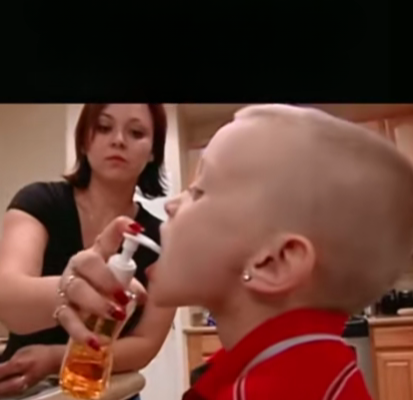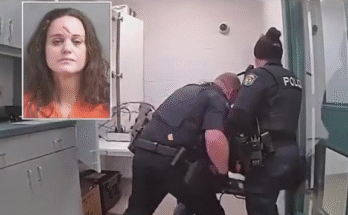What began as a seemingly ordinary day of parenting intervention quickly became one of the most unforgettable and talked-about moments in television history. The episode of Supernanny promised the usual mix of real-life parenting challenges, heartfelt lessons, and practical strategies—but it delivered something far more dramatic and controversial.
The scene opened in a suburban home, quiet except for the soft hum of cameras capturing every movement. The family seemed typical: a mother, her young son, and the small, everyday struggles of raising a child in a busy household. But as the episode unfolded, it became clear that this was not going to be a standard lesson in positive parenting.
The young boy, perhaps no older than six or seven, had misbehaved in a way that many children do—testing boundaries, expressing frustration, and challenging authority. What was intended as a teachable moment quickly escalated into a confrontation that left viewers around the world stunned.
The mother, in a moment that shocked the crew, attempted a disciplinary action that was both extreme and controversial. In her mind, she was enforcing a lesson; in reality, the method was unsafe and alarming. Cameras captured the boy’s bewildered reaction as he struggled to understand what was happening. His eyes widened with confusion, and a nervous tension filled the room—a tension that would not dissipate until a professional stepped in.

Enter Jo Frost, the renowned Supernanny, known for her calm, firm approach to even the most challenging households. She had entered countless homes, faced countless crises, and helped families navigate conflicts with empathy and structure. But nothing had quite prepared her—or the audience—for what was about to unfold in this particular living room.
Jo Frost approached the mother with the steady authority that had made her a trusted figure in parenting television. She calmly addressed the extreme method the mother had employed, explaining why it could be harmful to a child both physically and emotionally. But instead of diffusing the situation, the intervention ignited a fiery confrontation.
The mother, defensive and unwilling to consider an alternative, lashed out. She argued that her actions were necessary, that she was desperate to correct her child’s behavior, and that any suggestion otherwise undermined her role as a parent. The tension escalated as words were exchanged, each one sharper than the last, while cameras captured every moment.
Viewers at home watched in stunned silence as the drama unfolded. Social media erupted with reactions, debates, and analyses. Some criticized the mother for her extreme approach, emphasizing the potential risks and long-term consequences of such methods. Others sympathized, noting that parenting is difficult and that desperation can sometimes lead to poor decisions.
Jo Frost remained composed, her approach grounded in years of experience. She emphasized that discipline must never cross the line into harm and that trust between parent and child is fragile and invaluable. She highlighted strategies for teaching respect, responsibility, and self-control that foster growth without fear.
The confrontation became more than just a moment on television—it became a cultural touchpoint. Clips from the episode went viral, shared across platforms, sparking conversations among parents, educators, and psychologists. Discussions emerged about the fine line between discipline and abuse, about how children learn, and about the emotional impact of extreme punitive measures.
Experts weighed in, explaining that children absorb lessons not only from words but from the tone, intention, and safety of the disciplinary methods used. Harsh or frightening approaches, even when intended as guidance, can damage trust and create long-term emotional challenges. Jo Frost’s intervention exemplified a professional, evidence-based response to such situations: calm, corrective, and educational.
As the episode progressed, viewers were given insight into alternative strategies. Jo demonstrated methods for setting boundaries, communicating expectations clearly, and reinforcing positive behavior. The mother, initially resistant, gradually began to understand that there were safer and more effective ways to guide her child. The tension remained, but a pathway toward resolution emerged—a reminder that even in the most dramatic moments, learning and growth are possible.
Public reaction to the episode was intense. Online forums, parenting blogs, and social media channels were flooded with commentary. Some users expressed shock and outrage, condemning the mother’s actions and praising Jo Frost for stepping in decisively. Others debated the ethics of filming such confrontations, questioning whether exposing family struggles to a national audience was appropriate. Yet others shared personal stories, reflecting on times they had struggled as parents and how seeing the confrontation resonated with their own experiences.
Beyond the immediate drama, the episode sparked larger conversations about parenting in the modern era. Questions emerged about the pressures on parents, the challenges of balancing authority with empathy, and the societal expectations placed on caregivers. The incident became a catalyst for discussions on parenting philosophy, child psychology, and the importance of professional guidance when handling behavioral challenges.
The impact of the confrontation extended far beyond the television screen. Educators, psychologists, and parenting experts referenced the episode in workshops, seminars, and online discussions. It became a case study in what not to do, as well as a reminder of the value of professional support in parenting. Jo Frost’s intervention was praised as an example of how calm, informed guidance can redirect a potentially harmful situation into a teachable moment.
For the mother and child involved, the experience was transformative. While the confrontation was undoubtedly tense and emotional, it opened the door for reflection, growth, and change. Over time, with support and guidance, the family began to implement new strategies that promoted positive behavior, respect, and understanding. The incident served as a turning point—a dramatic reminder of the challenges of parenting and the potential for growth when interventions are handled thoughtfully.
The episode also underscored the responsibility of media in portraying family conflicts. By focusing on education and resolution rather than sensationalism, the show provided viewers with practical takeaways, encouraging empathy and understanding while highlighting the dangers of extreme disciplinary actions.
In the years since the episode aired, it has remained a reference point in conversations about parenting, discipline, and media representation. Clips continue to circulate online, sparking debate and reflection. Parents share the story as a cautionary tale, educators use it as a teaching tool, and audiences revisit it as an example of the dramatic tension that can arise when discipline crosses the line.
Ultimately, the confrontation between Jo Frost and the mother is remembered not only for its drama but for the lessons it imparted. It revealed the delicate balance parents must navigate, the consequences of extreme actions, and the power of calm, informed intervention. The story reminds us that parenting is never simple, that mistakes can happen, and that guidance, patience, and professional support are invaluable in raising children safely and respectfully.
In a world where parenting challenges are often amplified by stress, social expectations, and the pressures of daily life, the episode stands as a vivid illustration of both the risks and opportunities inherent in raising children. It demonstrates that even in the most dramatic circumstances, reflection, learning, and change are possible. And for audiences, it serves as a dramatic, memorable, and ultimately educational story—a cautionary tale of what can happen when discipline goes too far and a testament to the power of intervention guided by expertise and compassion.
By blending drama, narrative tension, and professional guidance, the episode left an indelible mark on viewers. It remains a reminder that while parenting is full of challenges, the choices made in moments of discipline have lasting consequences—and that approaching these moments with care, knowledge, and empathy is always the better path.



